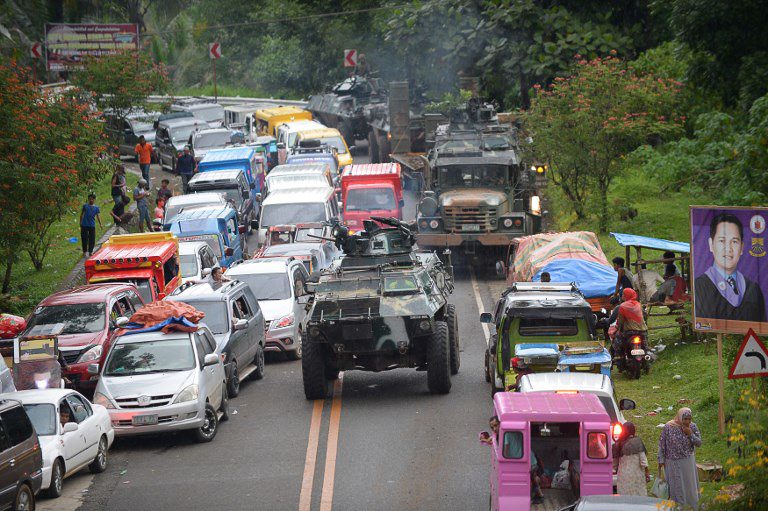SUMMARY
This is AI generated summarization, which may have errors. For context, always refer to the full article.

DAVAO CITY, Philippines – Days after President Rodrigo Duterte declared martial law in Mindanao, the Armed Forces of the Philippines (AFP) sought to downplay fears of state abuse.
“There are many quarters, on this account, there are many quarters who have been raising issues already. They are people living in the past,” said AFP spokesman Brigadier General Restituto Padilla in a press conference on Friday, May 26.
Duterte declared martial law and suspended the privilege of the writ of habeas corpus in Mindanao following clashes between government forces and members of the terrorist Maute and Abu Sayyaf groups in Marawi City on May 23.
Marawi residents reported hearing gunshots and explosions. Some posted photos of armed persons roaming the city streets and hoisting the Islamic State (ISIS) flag. The same night, at least 3 fires broke out in Marawi City.
It was the latest in a string of offenses by the Maute Group from late 2016 to early 2017.
Citing the Maute strikes, Duterte placed the entire island region under martial law for 60 days. The declaration stays in place unless Congress rejects it.
It may be extended if approved by Congress, whose members are mostly the President’s allies. The Supreme Court may also rule on the basis of the declaration if any citizen files a petition. (READ: Martial Law 101: Things you should know)
In the same press conference, Solicitor General Jose Calida expressed confidence the declaration would not be rejected because it had sound basis. But at the same time, Calida admitted he had not seen the entirety of the report that Duterte submitted to both houses of Congress.
Safeguards
Martial law strikes a chord with many Filipinos who are still reeling from the atrocities during the regime of the late dictator Ferdinand Marcos. More than 4 decades ago, Marcos placed the entire country under martial law, citing the supposed communist threat.
The declaration was followed by the swift rounding up of dissident voices and political foes. While martial law officially lasted until 1981, alleged human rights abuses and the pilferage of government funds marred the remaining years of Marcos, who was ousted in 1986.
Padilla insisted the martial law of 1972 and that of 2017 were declared in different contexts and more importantly, had different constitutional foundations.
“I would like to state that under the new basis for which martial law is declared, those of the past are very different from the way it is going to be implemented today,” he said.
While Duterte’s supporters say it’s unfair to compare his martial law to Marcos’, it was the former Davao City mayor himself who made that comparison.
“Martial law is martial law ha. It will not be any different from what the President, Marcos did. I’d be harsh,” Duterte said in a video posted hours before his declaration was made public in a press conference while in Russia.
But Padilla said the “harshness” would affect only those “committing acts of rebellion.” (READ: DND to AFP: Uphold rule of law, human rights in Mindanao)
“Again, we would like to assure the public and request you to trust and appeal to you – trust the Armed Forces, your Armed Forces, that we will do everything in our capacity, alongside the guidelines that have been set by the Constitution and the other guidelines that will be given to us,” he said.
Duterte met with his Cabinet, including top military and police officials Thursday evening, May 25, in Davao City.
During the meeting, Duterte repeatedly reminded both the AFP and Philippine National Police (PNP) to uphold human rights.
“[Duterte] said that we must guarantee, that for our citizens who are law-abiding, this will not impede any of their activities, and that they must not fear any measures,” said Padilla.
The AFP spokesman, who will also be the designated spokesman for all military actions under martial law, reminded those with unregistered firearms to either surrender their illegal weapons or find a way to legalize their ownership “so that you will be not be subject to the inconvenience of future search and seizure procedures.”
Marawi strikes
In Marawi City, where military operations continue, thousands of residents have already fled.
Padilla said the military is doing its best to minimize damage to property and avoid the loss of life.
“We assure our kababayan (countrymen) in Marawi, our Muslim brothers, that we are not bombing your city. We are merely performing surgical airstrikes with pinpoint accuracy to neutralize these threats that have been impeding the entry and movement of our troops,” he said.
The AFP said at least 31 fighters have been killed as a result of ongoing operations. Of those 31, at least 6 have been confirmed to be foreign combatants.
At least 11 soldiers and 2 cops have already died since the clashes began.
Martial law in Mindanao will be administered by Defense Secretary Delfin Lorenzana and implemented by the military, led by AFP chief General Eduardo Año. – Rappler.com
Add a comment
How does this make you feel?
There are no comments yet. Add your comment to start the conversation.